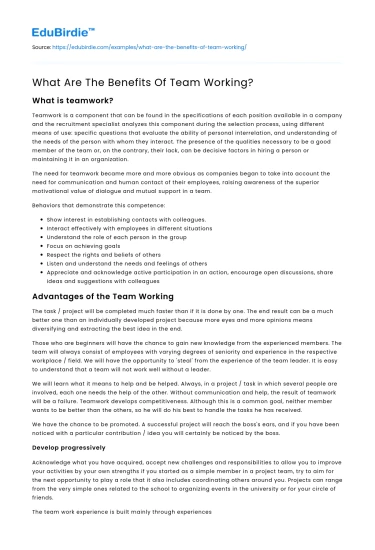What is teamwork?
Teamwork is a component that can be found in the specifications of each position available in a company and the recruitment specialist analyzes this component during the selection process, using different means of use: specific questions that evaluate the ability of personal interrelation, and understanding of the needs of the person with whom they interact. The presence of the qualities necessary to be a good member of the team or, on the contrary, their lack, can be decisive factors in hiring a person or maintaining it in an organization.
The need for teamwork became more and more obvious as companies began to take into account the need for communication and human contact of their employees, raising awareness of the superior motivational value of dialogue and mutual support in a team.
Save your time!
We can take care of your essay
- Proper editing and formatting
- Free revision, title page, and bibliography
- Flexible prices and money-back guarantee
Behaviors that demonstrate this competence:
- Show interest in establishing contacts with colleagues.
- Interact effectively with employees in different situations
- Understand the role of each person in the group
- Focus on achieving goals
- Respect the rights and beliefs of others
- Listen and understand the needs and feelings of others
- Appreciate and acknowledge active participation in an action, encourage open discussions, share ideas and suggestions with colleagues
Advantages of the Team Working
The task / project will be completed much faster than if it is done by one. The end result can be a much better one than an individually developed project because more eyes and more opinions means diversifying and extracting the best idea in the end.
Those who are beginners will have the chance to gain new knowledge from the experienced members. The team will always consist of employees with varying degrees of seniority and experience in the respective workplace / field. We will have the opportunity to 'steal' from the experience of the team leader. It is easy to understand that a team will not work well without a leader.
We will learn what it means to help and be helped. Always, in a project / task in which several people are involved, each one needs the help of the other. Without communication and help, the result of teamwork will be a failure. Teamwork develops competitiveness. Although this is a common goal, neither member wants to be better than the others, so he will do his best to handle the tasks he has received.
We have the chance to be promoted. A successful project will reach the boss's ears, and if you have been noticed with a particular contribution / idea you will certainly be noticed by the boss.
Develop progressively
Acknowledge what you have acquired, accept new challenges and responsibilities to allow you to improve your activities by your own strengths if you started as a simple member in a project team, try to aim for the next opportunity to play a role that it also includes coordinating others around you. Projects can range from the very simple ones related to the school to organizing events in the university or for your circle of friends.
The team work experience is built mainly through experiences in which you provide more support to the team than you expect them to give you.
How we can develop teamwork after employment?
Get involved!
Participate actively in the team, exchange information, listen and understand the views of the other members of the team. Try to develop new ideas based on what others have said. Avoid 'not so, I know another method'
Request permanent feedback!
Try to relate to the opinion of others. This does not mean that you have to be pleasant at any price but it is important to know what your colleagues think about your actions. Shares the suggestions and ideas of others, shows flexibility in expressing the different points of view of the team members.
Rate yourself
Analyze the activity carried out within the team: how did you feel, what was the contribution within the team? If you had very good results, that were the success factors. If you failed in other aspects, that was the cause. With the lessons learned he enters the next interaction with those around him more prepared to contribute and help them achieve even better results. Surprisingly, your results will grow as well.
In a contemporary organisations, “what were once competitors are now collaborators, what were once outsiders are now stakeholders, what were once stark boundaries are now fuzzy fences. Organisations have now discovered the value of collaboration, both inside and outside” (Brooks, 2006, p.115).
Teamwork has been linked to economic advantages, higher output, lower absenteeism and increased employee satisfaction (Steijn, 2001; Brooks, 2006; Buchanan and Hyczynski, 2007). It has also been shown to lead to less stressful work, reduced alienation and improved working relationships (Katzenback and Smith).
Conclusion
Teamwork is becoming increasingly important in contemporary organisations, and as long as teams are formed, managed and implemented effectively, can provide a source of competitive advantage in terms of increased employee satisfaction, creativity and innovation. However, if teams are assigned to inappropriate tasks, are managed ineffectively or not provided with adequate support, resources and autonomy to carry out their tasks then the effect of teamwork can be counterproductive.
References
- Testing Business Ideas: A Field Guide for Rapid Experimentation (David J. Bland and Alexander Osterwalder,2019)
- Remote Working: How to effectively and efficiently work from home in challenging times (Andrew Priestley ,2020)
- Working in a Team: A workbook to successful dynamics Paperback (Jane Bayliss, 2009 )






 Stuck on your essay?
Stuck on your essay?

